Please fill out the following information, and RRFC Admissions will contact you to discuss our program offerings:
Issue #120
by L. Swift and Jeff McQ
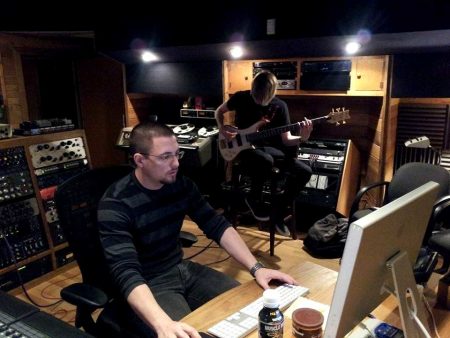
Recording Connection grad James Kyle Dickey

Studio A in Colorado Sound Studio
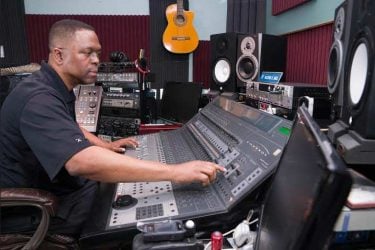 Congratulations to Recording Connection graduate Wayne E. Hill on the launch of his new studio, Golden Word Music Productions, LLC (Email: [email protected]), in San Antonio, TX. Speaking of his former mentor, Wayne says, “RC Mentor, Mark E. Sinko of Salmon Peak Studios, definitely cleared many fundamental mixing issues I had and helped me become an outstanding mixer. I still bug Mark from time to time!”
Congratulations to Recording Connection graduate Wayne E. Hill on the launch of his new studio, Golden Word Music Productions, LLC (Email: [email protected]), in San Antonio, TX. Speaking of his former mentor, Wayne says, “RC Mentor, Mark E. Sinko of Salmon Peak Studios, definitely cleared many fundamental mixing issues I had and helped me become an outstanding mixer. I still bug Mark from time to time!”
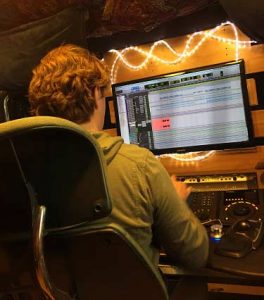 Impromptu shot by Recording Connection student Greg Abeyta (Denver, CO) of mentor Ryan Conway of Conway Studios. “This picture was taken only a few weeks into my schooling. I was sitting in on a session that I really enjoyed. Both Ryan and his client were nice guys and I respect Ryan a lot. He’s a great teacher and is very thorough with his teaching. The studio is nice and the vibes when you’re there are great.”
Impromptu shot by Recording Connection student Greg Abeyta (Denver, CO) of mentor Ryan Conway of Conway Studios. “This picture was taken only a few weeks into my schooling. I was sitting in on a session that I really enjoyed. Both Ryan and his client were nice guys and I respect Ryan a lot. He’s a great teacher and is very thorough with his teaching. The studio is nice and the vibes when you’re there are great.”
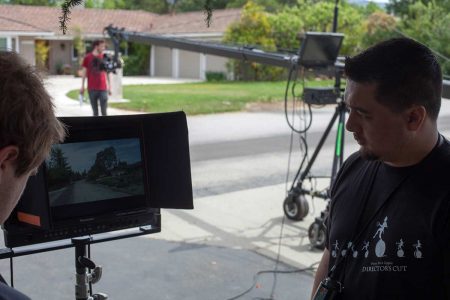
FC mentor Sean McCarthy
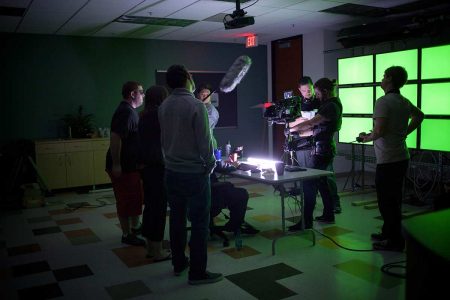 “The only way you’re going to see if people are really willing to learn, and able to learn, and deal with the situation, is to push them off a cliff and see if they’re going to fly, and see if they’re going to take to it. Because the people that do…I think it’s the privilege that I feel as I get to see people thrive under that circumstance, and I get to see people move up…As a mentor, you’re in a coach position, too. I’ll guide them, and if I see that they rise to certain occasions, you give them more opportunities. It’s a cool thing that you’re able to see, if you can give them opportunities, and to see if they fly with it. And if they do take off with it, I think it’s one of the great pleasures to see people really take to something. I’ve seen people on set say, ‘Wow, this is the life for me.’ That’s one of the cool things to know that you helped somebody find their passion, or find their dream.
ON THE JOYS OF WATCHING STUDENTS BECOME COLLABORATORS BY TEACHING THEM ON THE JOB:
“One of the things I love is teaching, but as a working professional, I don’t have the time to go to schools [and] teach. I’ve gone and guest lectured for a day; that’s my commitment is that one class to come and talk to. But when I get to pair that with students where I’m working on a real-time project, then they become a collaborator, they become a teammate that I cannot just mentor, but I can be hand-in-hand with, because those opportunities only happen when you’re in the middle of it…I think on set, theory and actually putting it into practice is like being on set and going, ‘All right, we’re filming in a crack house. They didn’t teach you this part in film school. How do you protect $150,000 worth of gear, and get the shot, and get out of here as fast as humanly possible?’…
“In our apprenticeship mentoring program, we put people in positions to learn. You start observing, and then you start participating. Based on what they put into it, they grow more. Some of the people behind the scenes like Dustin Strocchia (director, lead editor) and Kevin Loader (lead VFX artist, cinematographer), they’re two of my key collaborators, and they started in the mentoring program that we do. And now they’re just key creative partners of mine who I work with on a daily basis…It’s a great thing to see your team, too, part of your teammates came from starting early with no experience or limited experience. And then being able to see them thrive, and the opportunity that they’ve been given, and they’re able to proceed forward, they grow. Then you rely on them to pull off something crazy.”
ON HOW HE NEVER STOPS LEARNING AS A FILMMAKER:
I feel like even though I mentor a lot of students [and] I have the privilege of being able to pass knowledge forward and also send the elevator down, I always feel, myself, like an eternal student. There’s always that passion to figure out new stuff. I think that directors that I really like and the artists I really like have that same approach, because the moment you think you know it all is the moment you stop learning. And I think that’s why I even approach projects with that thing of like, ‘Well, I’ve never done this before, so let me figure this out.’ That’s always a fun thing to approach…I always feel like each project is…as you’re creating a project, it’s also a learning tool until the next project.”
Doucheaholics, the comedic web series worked on by several of Sean’s apprentices, premieres at Dances with Films, June 10th at the historic Chinese Theatre in Hollywood!
“The only way you’re going to see if people are really willing to learn, and able to learn, and deal with the situation, is to push them off a cliff and see if they’re going to fly, and see if they’re going to take to it. Because the people that do…I think it’s the privilege that I feel as I get to see people thrive under that circumstance, and I get to see people move up…As a mentor, you’re in a coach position, too. I’ll guide them, and if I see that they rise to certain occasions, you give them more opportunities. It’s a cool thing that you’re able to see, if you can give them opportunities, and to see if they fly with it. And if they do take off with it, I think it’s one of the great pleasures to see people really take to something. I’ve seen people on set say, ‘Wow, this is the life for me.’ That’s one of the cool things to know that you helped somebody find their passion, or find their dream.
ON THE JOYS OF WATCHING STUDENTS BECOME COLLABORATORS BY TEACHING THEM ON THE JOB:
“One of the things I love is teaching, but as a working professional, I don’t have the time to go to schools [and] teach. I’ve gone and guest lectured for a day; that’s my commitment is that one class to come and talk to. But when I get to pair that with students where I’m working on a real-time project, then they become a collaborator, they become a teammate that I cannot just mentor, but I can be hand-in-hand with, because those opportunities only happen when you’re in the middle of it…I think on set, theory and actually putting it into practice is like being on set and going, ‘All right, we’re filming in a crack house. They didn’t teach you this part in film school. How do you protect $150,000 worth of gear, and get the shot, and get out of here as fast as humanly possible?’…
“In our apprenticeship mentoring program, we put people in positions to learn. You start observing, and then you start participating. Based on what they put into it, they grow more. Some of the people behind the scenes like Dustin Strocchia (director, lead editor) and Kevin Loader (lead VFX artist, cinematographer), they’re two of my key collaborators, and they started in the mentoring program that we do. And now they’re just key creative partners of mine who I work with on a daily basis…It’s a great thing to see your team, too, part of your teammates came from starting early with no experience or limited experience. And then being able to see them thrive, and the opportunity that they’ve been given, and they’re able to proceed forward, they grow. Then you rely on them to pull off something crazy.”
ON HOW HE NEVER STOPS LEARNING AS A FILMMAKER:
I feel like even though I mentor a lot of students [and] I have the privilege of being able to pass knowledge forward and also send the elevator down, I always feel, myself, like an eternal student. There’s always that passion to figure out new stuff. I think that directors that I really like and the artists I really like have that same approach, because the moment you think you know it all is the moment you stop learning. And I think that’s why I even approach projects with that thing of like, ‘Well, I’ve never done this before, so let me figure this out.’ That’s always a fun thing to approach…I always feel like each project is…as you’re creating a project, it’s also a learning tool until the next project.”
Doucheaholics, the comedic web series worked on by several of Sean’s apprentices, premieres at Dances with Films, June 10th at the historic Chinese Theatre in Hollywood!

RRFC is education upgraded for the 21st century.
Get the latest career advice, insider production tips, and more!
Please fill out the following information, and RRFC Admissions will contact you to discuss our program offerings:
Stay in the Loop: Subscribe for RRFC news & updates!
© 2025 Recording Radio Film Connection & CASA Schools. All Rights Reserved.


